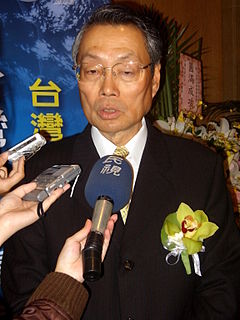A Quote by Neri Oxman
Prior to the Industrial Revolution, hand-production methods were abundant. Craft defined everything. The craftsman had an almost phenomenological knowledge of materials and intuited how to vary their properties according to their structural and environmental characteristics.
Related Quotes
The chemists work with inaccurate and poor measuring services, but they employ very good materials. The physicists, on the other hand, use excellent methods and accurate instruments, but they apply these to very inferior materials. The physical chemists combine both these characteristics in that they apply imprecise methods to impure materials.
Necessity is not the mother of invention. Knowledge and experiment are its parents. It sometimes happens that successful search is made for unknown materials to fill well-recognized and predetermined requirements. It more often happens that the acquirement of knowledge of the previously unknown properties of a material suggests its trial for some new use. These facts strongly indicate the value of knowledge of properties of materials and indicate a way for research.
Two hundred years ago, we were all busy farming and we all had a role to play. The home was a unit of production. We made food and all the things we needed, we took care of our kids and were connected to purpose in our evolution. When the Industrial Revolution came along, it took away a lot of the work the men had done.
The tragic effects of terrorism have forced the new-construction industry to re-evaluate traditional methods of fire protection in commercial infrastructures. That includes everything from building codes, to structural design issues and the less durable fireproofing materials currently specified for commercial steel structures.
So far as Chairman Mao's own hopes were concerned, he initiated the "Cultural Revolution" in order to avert the restoration of capitalism, but he had made an erroneous assessment of China's actual situation. In the first place, the targets of the revolution were wrongly defined, which led to the effort to ferret out "capitalist roaders in power in the Party". Blows were dealt at leading cadres at all levels who had made contributions to the revolution and had practical experience, including Comrade Liu Shaoqi.
First, what is a revolution? Sometimes I'm inclined to believe that many of our people are using this word "revolution" loosely, without taking careful consideration [of] what this word actually means, and what its historic characteristics are. When you study the historic nature of revolutions, the motive of a revolution, the objective of a revolution, and the result of a revolution, and the methods used in a revolution, you may change words. You may devise another program. You may change your goal and you may change your mind.
It is much more accurate to identify the factors of production as know-how (that is genetic information structure), energy, and materials, for, as we have seen, all processes of production involve the direction of energy by some know-how structure toward the selection, transportation, and transformation of materials into the product
When the industrial revolution happened there was the Luddistic movement, and there was a fear that machinery would replace all the labor. Whenever we had a technological revolution we had this fear. So if you look backwards, these fears were not justified, and I think they were driven by our very human inability to visualize what new jobs will be created by this new technology.
Because I had visited Silicon Valley, I recognized the microprocessor was going to lead the second industrial revolution. We Chinese could not miss that opportunity again - we missed the first industrial revolution already. We put our effort into trying to bring this new technology from the United States to Taiwan. That was the begining of Acer.








































